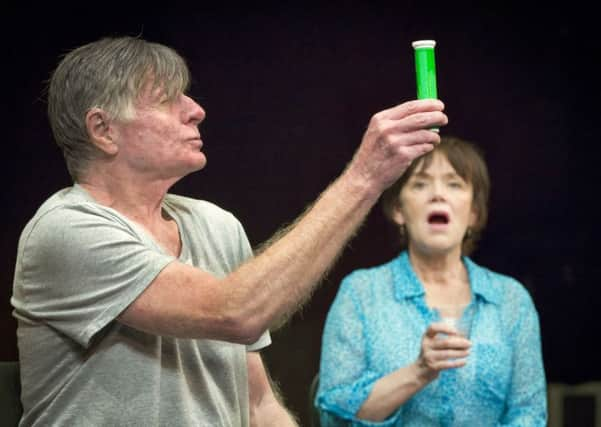Theatre preview: A family's liberal values are tested by a charming Nazi in Winter Solstice


This is the scenario around which German playwright Roland Schimmelpfennig builds his 2014 play Winter Solstice, the latest international success in a playwriting career which Schimmelpfennig, now 50, says has been becoming “more and more political” as he grows older. The acclaimed British premiere production of Winter Solstice is set to arrive in Edinburgh next week as part of a UK tour; and its theme is the one foreshadowed in British poet Michael Rosen’s famous verse about how fascism – that bogeyman of history – does not arrive in Nazi fancy dress, like a parade of monsters, but with a friendly face, promising to restore your pride, give you a job, clean up the neighbourhood, and put an end to corruption. Over a harsh and often hilarious two hours, Schimmelpfennig seeks to show how every member of his imagined family except Albert, the host, falls for Rudolph’s charm, and fails to see the danger he presents; and how even Albert is finally too polite, and too full of decent liberal self-doubt, to stand up to the man, and throw him out.
“There’s was always plenty of theatre going on in Göttingen, where I grew up,” says Schimmelpfennig, who now lives in Berlin, “and I always just loved it. I didn’t know whether it would be realistic to make a living in theatre, although I knew I wanted to do something with words; so at first I became a journalist. But that didn’t work; so I went to study theatre, in Munich, and began to write plays.”
Advertisement
Hide AdAt first, Schimmelpfennig trained to be a director, a trade he still plies occasionally; and he has also worked as a dramaturg, preparing other people’s texts for the stage. In the last 15 years, though, he has emerged one of the most acclaimed German playwrights of his generation; and although his earlier plays dwelt on more personal themes, he says that he increasingly feels a need to try to “hold a mirror up to society.” His play Golden Dragon, set in a restaurant kitchen staffed by illegal migrant workers, was seen at the Traverse during the Edinburgh Festival of 2011.
“Back around 2013, I really wanted to write a play about the growing influence of the far right in Europe,” says Schimmelpfennig, “although of course this was before the new far-right party the AfD really emerged in German politics, before Trump, and before Brexit, with all that that could mean. Plays often take strange ways of coming to life; and I had this old idea about Christmas in Auschwitz, and what it would be like to see someone like Eichmann celebrating in that place, that gradually grew and changed in my mind until it became this play, set at Christmas, in a middle-class German family today.”
Schimmelpfennig’s central concern, he says, is to ask why we in the West are often so hesitant to defend our democratic liberal values; yet he also feels there is no simple answer to the question, and that each character has a different weakness in the face of Rudolph’s charm offensive. He is clear, though, that he does not want to leave audiences feeling hopelessly depressed about the failures of the liberal West; and ATC’s associate director Alice Malin, who has directed this touring production based on Ramin Gray’s original 2017 staging, feels that the play’s impact is anything but downbeat.
“It is a bit Brechtian,” she says, of a play that involves characters speaking their own stage directions, and is set, in this production, in what looks like a rehearsal room. “But it’s also, in some ways, very like Alan Ayckbourn – sharp, funny middle-class comedy, with very relatable characters. Before we started work on this production, the cast and I did a lot of reading around the way people perceived Nazism in the 1930s – we read Hannah Arendt’s book about the banality of evil, Albert Speer’s autobiography, that kind of thing.
“But then you just dive into this fairly riotous comedy about a divided family, in which all the characters are an allegory for different broken parts of a nation state. It’s a very difficult play for actors to learn – its time-frame is always jump-cutting, it leaps around from narrative to dialogue to action. But once they get it, it’s a joy. And I think the real point is perhaps for audiences to identify with this central character, Albert, and to see where he fails; to realise that if you’re going to oppose this kind of ideology, then action and positivity are the way to do it.”
Schimmelpfennig agrees that the effect of the play should be invigorating rather than disempowering. “People should be amused, entertained and provoked by this play,” he says, “and I certainly don’t want to depress them. I see theatre as a sensuous and playful place, so I don’t write agitprop, I don’t want to instruct people. But you can try to give some kind of wake-up call; and my hope is that this play does that – and that it doesn’t come too late.”
Winter Solstice is at the Traverse Theatre, Edinburgh, from 21-24 March, www.traverse.co.uk